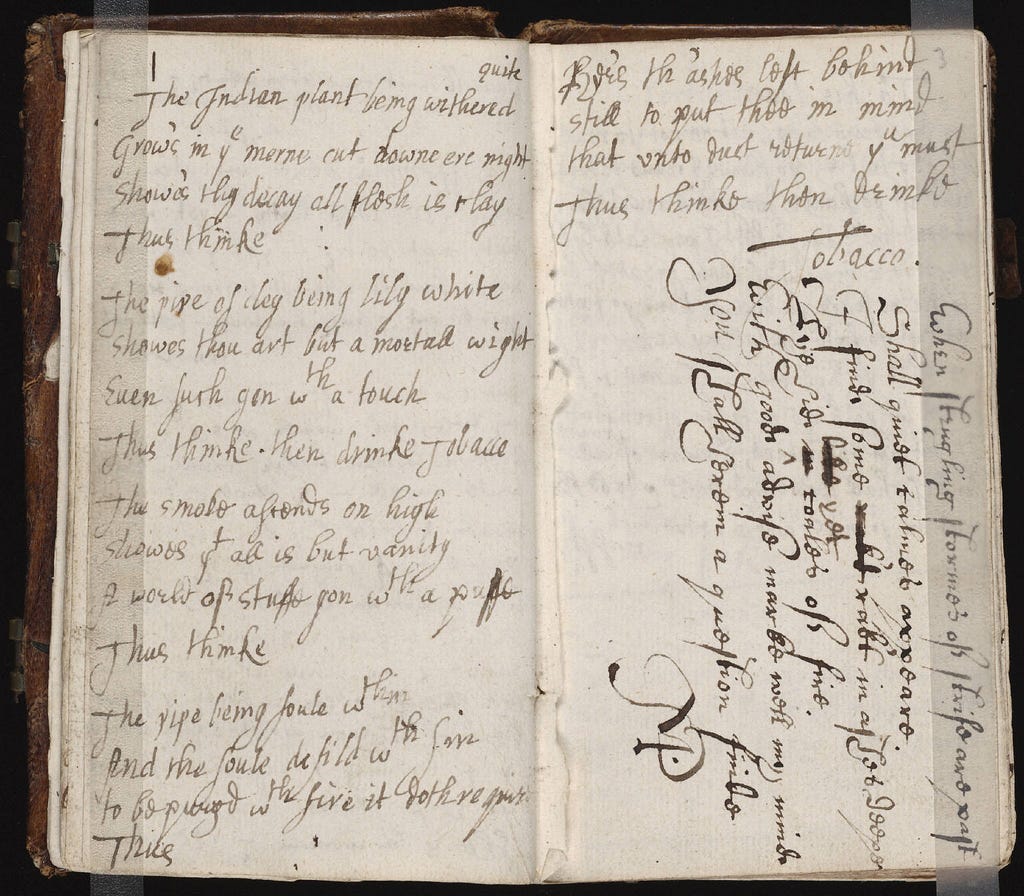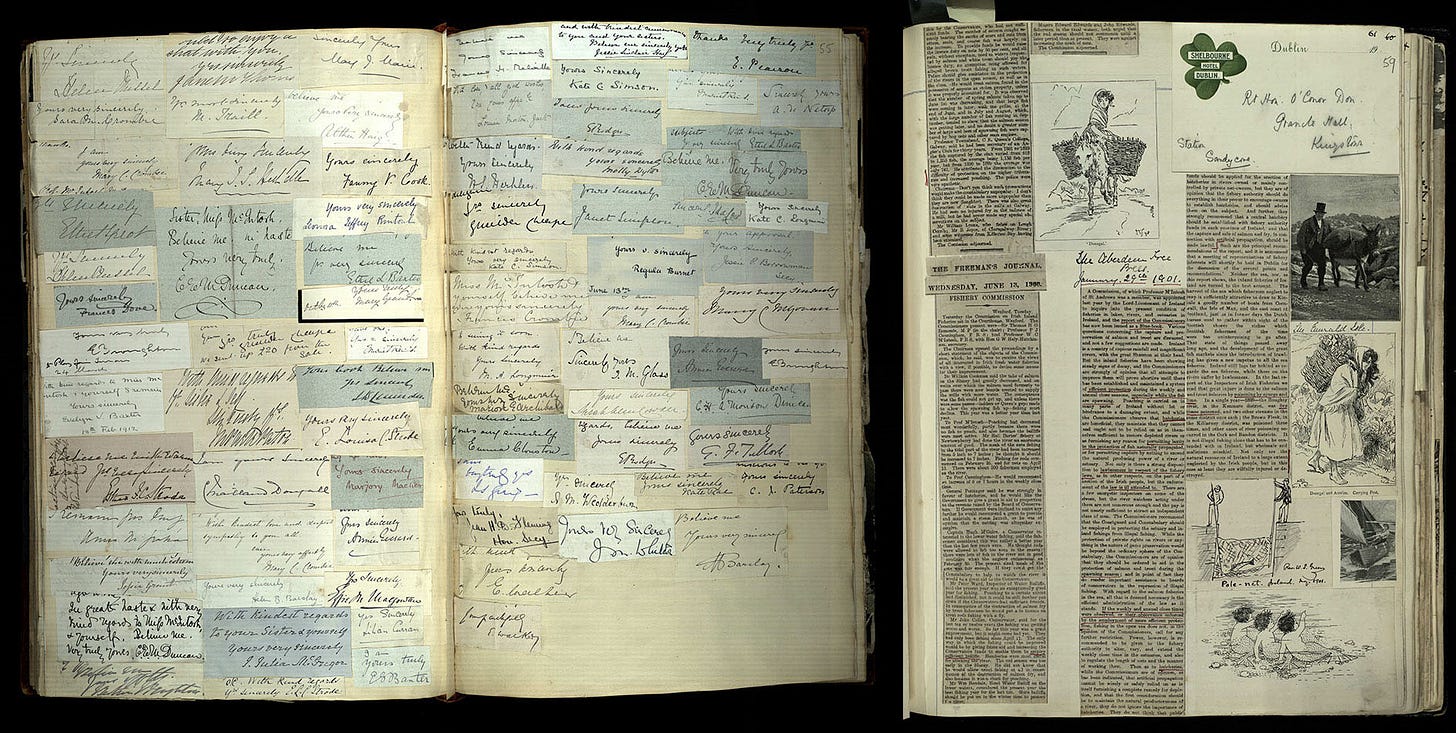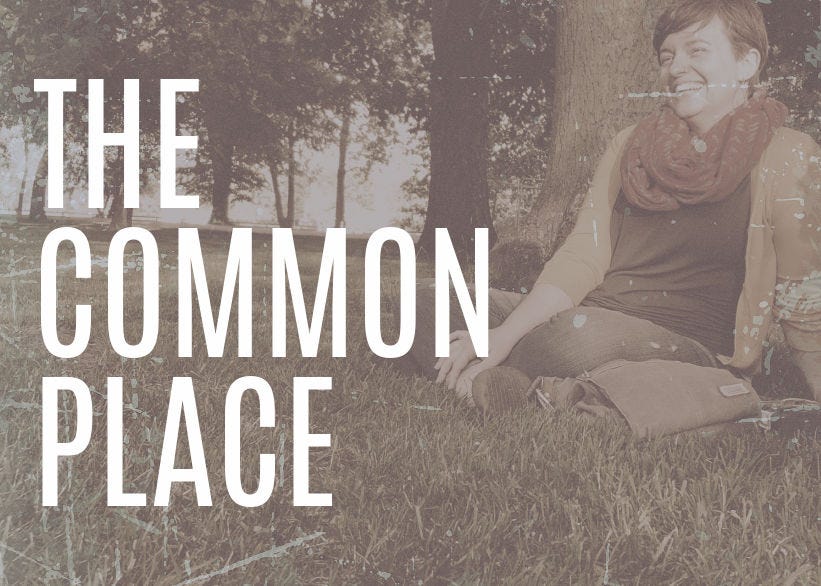Florilegia 🌿
To do the useful thing, to say the courageous thing, to contemplate the beautiful thing: that is enough for one person’s life. - TS Eliot
Last week when I asked subscribers here to share a quote you loved, I mentioned in passing my commonplace book, and the practice of commonplace books in general. More than a few of you were glad to know the name of a long-storied habit of collecting favorite quotes, ideas, and notes into one simple, pocketable place.
Great thinkers throughout history have kept commonplace books, from Marcus Aurelius to Lewis Carroll to Walt Whitman to Charlotte Mason and countless Victorian-era women.
More than a scrapbook, these personal journals became safe havens for the ideas that mattered most to people. Seldom tidy, sometimes ephemeral, almost always handwritten, commonplace books serve as beautiful relics of a person’s priorities, questions, doubts, and assurances through the wisdom of others.

Every year I assign the keeping of a commonplace book to my high school students, not because I think they’ll love the practice as teens, but because I know they’ll be glad later they did so. I personally keep my own simple collection of quotes here these days – even though I’d prefer handwritten, right now it’s digital because it’s easiest and done is better than perfect.
In medieval times, commonplace books had a more flowery name: florilegium. Florilegium is a portmanteau of the Latin words flos (flower) and legere (to gather): literally, a gathering of flowers. A bouquet! Florilegia were books with extracts of other books, usually from Church fathers and mothers, philosophers, and other classical writers. It was a common practice by literate people, and in the big scheme of things, only in the past century or so has it become less known.
I suppose you could say blogging and social media became a form of this, and that’s fair. But I’d wager the motive has changed in the past decade, from something to do for the inherent beauty of the act of collecting truth and goodness to something more ….social. Emotional. Often with the motive of making a name for oneself as a tastemaker, an influencer. The types of things one curates and collects become less for one’s own growth and wisdom and more for an appearance of Someone Who Knows Things. A Thought Leader™.
That motive sullies the innocent delight of a commonplace book, I say. While some of the famed keepers of these historic books probably wouldn’t mind being renown for their collections, none of them did the collecting for anything more than for their own good, for the joy of creating word bouquets.
A commonplace book isn’t where you write your deepest, darkest secrets, it’s where you toy and fiddle with scraps of wisdom. It’s a space to let the act of collecting words and arranging them just-so make you more human, more of who you’re meant to be.
Because of this, the name of this newsletter is The Commonplace. Here are a few other reasons:
1. Commonplace can also mean Common Place — a shared space. I’ve grown to love the sacred act of having meaningful conversations in meaningful places (like what we do on Literary London, and in the weekend gathering we had in fall 2019), and I like to think this little corner of the internet is the digital form of that.
2. Common Place also evokes something I care deeply about, and I think many of you do, too: caring for and about the collective common good. We don’t just learn about the world, make money, raise our kids well, read good books, steward the earth, love God, and wave hi to our neighbors for the heck of it. We do it to make our little nooks of the world a better place, to love our neighbors as ourselves.
3. Finally, The Commonplace provides a wide berth for many topics. I love talking books, travel, stories, and places, and plan to keep doing so. But I don’t want to paint myself in a corner (ask me about a little blog name I couldn’t shake not quite ten years ago).
The 5 Quick Things I write for everybody on Fridays will remain free. I’ll still include extras here and there like chat spaces, book clubs, WRLD at Home episodes, snippets from books I’m writing, and a hodgepodge of other occasional sundry for those of you who financially subscribe. You know, like a commonplace book.
My primary work remains longer-form writing, such as books and essays. I still enjoy podcasting with my friend and co-host Seth Haines, and I’m glad to hear A Drink With a Friend resonates with so many of you, too.
As always, I’m grateful and honored you’re reading these words — it’s no small thing these days to let someone into your email inbox, so I truly count it a privilege. The digital world is noisy, and my desire is to keep whatever resonance I make a pleasant din.
I look forward to collecting more florilegia with you here — the world is a meadow of beauty, goodness, and truth, and it all makes for a lovely bouquet. Let’s gather it together.
Oremus pro invicem,
Tsh
p.s. - Do you keep a commonplace book? I’d love to hear about it — tell me more in the comments.
p.p.s. - If you’d like to join The Commonplace at the subscriber level but finances prohibit you from doing so, let us know. We’ll set you up! And if you have the ability to offset someone’s cost alongside yours, you’re able to do that as well — and thanks so much in advance.








I love this, Tsh. Commonplace also makes me think of my favorite collection of Wendell Berry essays, The Art of the Commonplace!
I do keep a commonplace book -- and I love the little book qua book almost as much as I love what I've written in it. The one I carry in my purse right now is a purple-and-green plaid (Isle of Skye tartan) and is called "Waverley Genuine Tartan Cloth Commonplace Notebook." They come in a huge variety of plaids and I have a different one on my shelf to use when my current one is full.